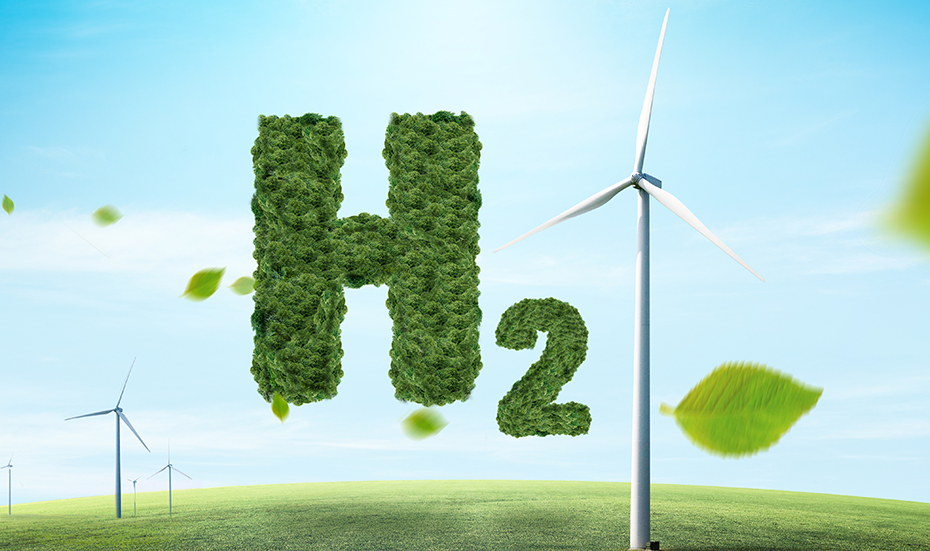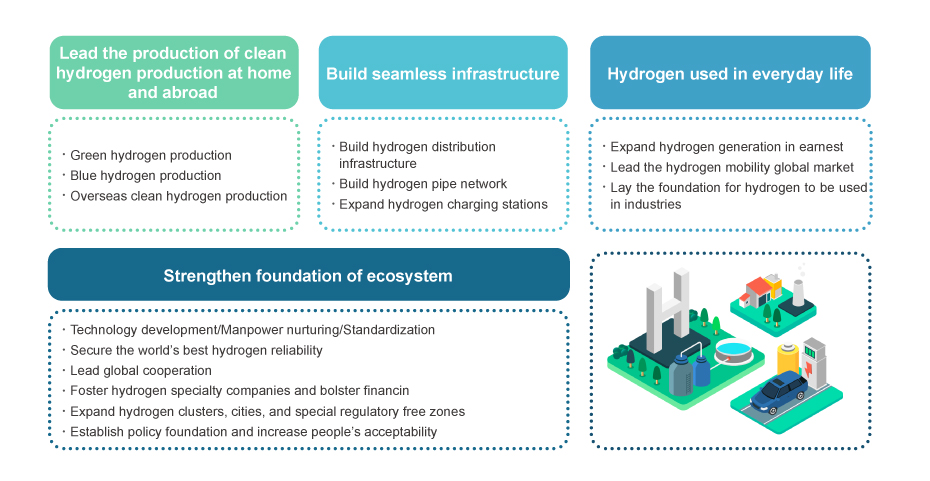Since designating the ‘hydrogen economy’ as one of the three strategic investment fields for innovative growth in 2018, Korea has laid the policy foundation to reinvigorate the hydrogen economy. It presented the policy and technological blueprint for the transition from a carbon economy to a hydrogen economy through the “Hydrogen Economy Roadmap” and the “Hydrogen Technology Development Roadmap” in 2019, preparing the policies for the transition to a hydrogen economy. In February 2020, it enacted the “Hydrogen Economy Promotion and Hydrogen Safety Management Act (so-called Hydrogen Act)” for the first time in the world, establishing a government-led active support system for revitalization of the hydrogen economy and the creation of a hydrogen industrial ecosystem.
Achievement of Korea’s Push Towards Hydrogen Economy
ased on the government’s active policy support measures, Korea’s hydrogen economy has grown fast. In particular, as the policy direction of the “Hydrogen Economy Roadmap” was focused on fostering hydrogen vehicles and hydrogen fuel cells, there have been significant achievements in the deployment of hydrogen cars and hydrogen fuel cells. By 2021, about 737 MW hydrogen fuel cells for domestic generation was deployed, while about 170 hydrogen charging stations for commercial purposes were built throughout the country. Until 2021, 19,270 hydrogen passenger cars have been distributed, along with 129 hydrogen buses. Last year, the number of hydrogen cars exported amounted to 1,121.
Korea’s Hydrogen Industry Trends (as of December 2021)
Korea’s Hydrogen Industry Trends (as of December 2021)
| Sector |
Share (%) |
Share by Size of Company (%) |
Revenue in Hydrogen (KRW millio
(KRW million) |
Investment in Hydrogen
(KRW million) |
| Large |
Middle |
SMEs |
Others |
| Hydrogen Production |
28.6 |
46.4 |
30.5 |
27.5 |
14.1 |
4,002,871 |
113,755 |
| Hydrogen Distribution |
27 |
27.3 |
37.6 |
25.6 |
17.9 |
1,784,490 |
76,355 |
| Hydrogen Utilization |
25.1 |
13.2 |
21.4 |
28.3 |
13.3 |
2,218,448 |
525,105 |
| Hydrogen Related Service |
19.3 |
13 |
10.6 |
18.7 |
54.7 |
263,496 |
84,805 |
| Total |
100 |
100 |
100 |
100 |
100 |
8,269,305 |
800,020 |
※ Source: Hydrogen Economy Portal (https://www.h2hub.or.kr/main/pageLoad.do)
In addition, the government has selected ‘hydrogen-specialized companies’ and actively supported them if they meet the certain criteria, such as the share of research and manpower development spending or sales amount of hydrogen businesses, among those engaged in industries related to production, storage, transportation, and sales of hydrogen. The government is developing policies including technological and management consulting, support for technology commercialization, expansion of sales channels, and financial support, in order to help create leading companies in the hydrogen industry. Based on such policy support, 32 companies were selected as hydrogen-specialized companies as of February 2022. Of them, 12 are engaged in the hydrogen fuel cell sectors, accounting for the largest share of total. In addition, companies involved in hydrogen charging stations, hydrogen mobility, and hydrogen production, storage, and transportation have been designated as hydrogen-specialized companies.
Expansion of Investment to Lead the Hydrogen Economy and Create the Industrial Ecosystem
Domestic companies are pushing for hydrogen businesses in earnest for the transition to a hydrogen economy. In September 2021, the Korea H2 Business Summit, a private consultation body consist of 17 members including SK Group, Hyundai Motors, and POSCO, among others, was launched. The members announced investment plans worth KRW 43.4 trillion combined, across the entire hydrogen economy sector by 2030. SK Group announced the largest investment plan, worth KRW 18.5 trillion, followed by Hyundai Motors with KRW 11.1 trillion, and POSCO with KRW 10 trillion. As such, the automobile, steel, and petrochemical industries have proactively made investment plans. Also, the Korea H2 Business Summit made it official to launch the ‘Hydrogen Fund’ at the ‘2022 H2 Investor Day’ held on July 6-7, with the goal of creating the fund worth KRW 500 billion through financing from domestic companies and external investors. For the successful creation of the private-led hydrogen fund, the government plans to support the expansion of financial support through policy financial institutions, preparation of support system through energy-related public organizations, and regulatory innovation for the discovery and operation of hydrogen projects. .
Establish Full Life-Cycle Ecosystem of Clean Hydrogen Economy to Achieve Carbon Neutrality
To achieve the 2050 carbon neutrality goal, the Korean government has transformed the policy direction of hydrogen economy promotion from fostering industries to the establishment of a ‘clean’ hydrogen ecosystem. The government announced implementation strategies to build the clean hydrogen industrial ecosystem through the “1st Hydrogen Economy Transition Basic Plan” in November 2021, and has implemented follow-up measures to revitalize the clean hydrogen economy. In the “1st Hydrogen Economy Transition Basic Plan”, the hydrogen demand in Korea was expected to become about KRW 3.9 million tons by 2030, and about 27.9 million tons by 2050. In this Basic Plan, when compared to the “Hydrogen Economy Roadmap” of 2019, the role of hydrogen as a means to reduce greenhouse gas is notable—the expansion of hydrogen and ammonia generation and promotion of hydrogen in the steel, petrochemical, and cement industries. Also, Korea plans to introduce about 82% of the hydrogen demand from overseas in 2050. To increase the self-sufficiency rate, the government is actively encouraging Korean companies to enter countries conducive to hydrogen production, where they can develop and produce clean hydrogen, which will then be introduced back to Korea.
4 Strategies and 15 Tasks Contained in “1st Hydrogen Economy Transition Basic Plan”
※ Source: Written by the author based on the “1st Hydrogen Economy Transition Basic Plan (Nov. 26, 2021)”
The Korean government has been laying the policy foundation to activate production, distribution, utilization, and investment in clean hydrogen in such ways as the clean hydrogen certification system and the Clean Hydrogen Energy Portfolio Standard (CHPS) when enacting the Hydrogen Act in June 2022. Going forward, the Korean government is expected to expand policy and institutional support to stimulate revitalization of the hydrogen economy led by the private sector.
By Jiyoung An (Ph.D in Economics) (jyan@keei.re.kr))
Korea Energy Economics Institute












